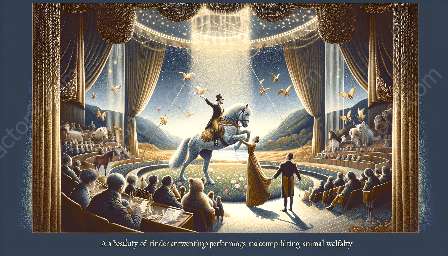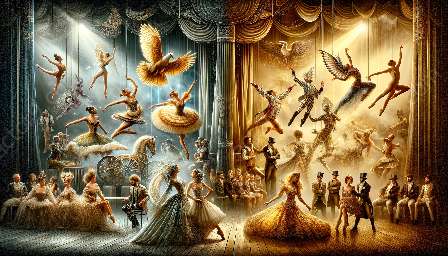Entering the world of circus arts introduces performers to a unique blend of physical skill and psychological resilience. In the context of circus festivals and competitions, the psychological aspects play a crucial role in determining a performer's success. This article will delve into the psychology behind circus performances, exploring the mental challenges, emotional highs and lows, and the factors that contribute to a successful performance.
The Mental Preparedness
Performing in circus festivals and competitions requires a high level of mental preparedness. The intense training and rigorous practice routines demand focus, determination, and mental fortitude. Performers must develop the ability to overcome fear and anxiety, as they often find themselves executing highly challenging and daring acts in front of large audiences. The mental preparedness involves managing stress, maintaining concentration, and cultivating a positive mindset.
Emotional Impact
While the physical prowess of circus performers is evident, the emotional resilience required often goes unnoticed. The pressure to deliver flawless performances, coupled with the competitive nature of festivals and competitions, can create a rollercoaster of emotions for performers. From the exhilarating highs of a successful act to the crushing disappointment of a mishap, circus performers must navigate a wide range of emotions. Coping with the fear of failure and managing the emotional impact of both success and setback is an integral part of the psychological aspect of performing in circus events.
Self-Confidence and Self-Efficacy
Self-confidence and self-efficacy play a significant role in shaping the psychological mindset of circus performers. Believing in one's abilities, trusting the training process, and maintaining a strong sense of self-efficacy are essential for overcoming performance anxiety and self-doubt. In the competitive environment of circus festivals and competitions, a performer's self-belief can be the defining factor that sets apart an outstanding performance from a mediocre one.
Managing Pressure
The combination of public scrutiny and the desire to excel can create immense pressure on circus performers. Managing this pressure requires psychological strategies that enable performers to stay focused and perform at their best, even under stress. Techniques such as visualization, mindfulness, and relaxation methods are commonly used to manage performance anxiety and maintain composure during high-stakes events.
Support Systems and Peer Relationships
Behind the scenes of circus festivals and competitions, the psychological dynamics of support systems and peer relationships come into play. The camaraderie among performers, the support of coaches and mentors, and the sense of belonging within the circus community all contribute to the psychological well-being of performers. Building healthy relationships and seeking support from peers can provide the necessary emotional sustenance and confidence boost required to thrive in the competitive circus environment.
Conclusion
Performing in circus festivals and competitions demands more than just physical prowess. It calls for a deep understanding of the psychological aspects that influence a performer's mindset, emotional resilience, and overall well-being. The mental preparedness, emotional impact, self-confidence, pressure management, and support systems collectively shape the psychological landscape of circus performers. By acknowledging and addressing these psychological aspects, performers can enhance their ability to deliver captivating, impactful, and memorable performances, thus enriching the world of circus arts.


































